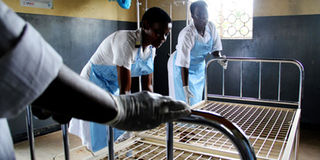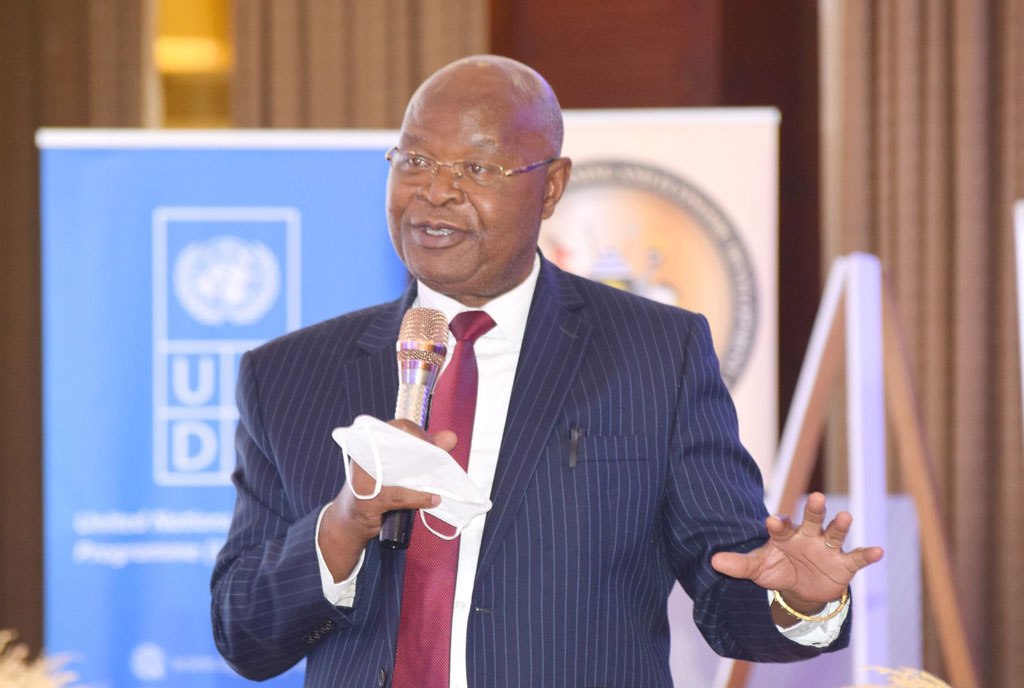Two more Ebola cases confirmed

Nurses prepare an isolation facility at Nyimbwa Health Centre in Luweero District recently. PHOTO BY ISAAC KASAMANI
What you need to know:
Panic reported at the different health centres in Luweero, with several patients reportedly abandoning health facilities, while medical personnel claim they have not received protective gear.
Blood samples sent to the Uganda Virus Research Institute, Entebbe by Luweero District medical department have confirmed two more Ebola positive patients, bringing the number to four, including the two who passed away last week.
The Luweero District Health Officer, Mr Joseph Okware, said blood samples for a patient admitted to Bombo Army General Hospital on Monday, have tested positive with Ebola Sudan strain and another patient who was in close contact with one of the victims and is now admitted to Mulago National Referral Hospital, has also been confirmed Ebola positive.
“We are also sending more blood samples for five people whom we suspect came in contact with some of the victims. We also have a confirmation that the woman who had crossed to Jinja yet she is a key contact person has been intercepted by the medical teams,” Dr Okware said.
Panic has been reported at the different health centres in Luweero, with several patients reportedly abandoning the health units while the medical personnel claim they have not received protective gear.
“It would be very important that the lives of the health workers are also secure because our units have not closed,” a nurse at Bamunanika Health Centre III who did not want her names mentioned, said.
However, Dr Okware said while the main focus was on the facilities at Bombo Military Hospital, Kasana Health Centre IV and Nyimbwa Health Centre, the other units, would also be taken care of.
“We are still receiving some of the protective gear,” Mr Oware said. Meanwhile, the Isolation centre for suspected and confirmed Marburg virus patients at Mbarara Regional Referral Hospital has been reopened with one admission; two days after health officials announced its closure.
Sister Eugenia Namulindwa, the officer in-charge of the Isolation unit, said yesterday Mr Edward Mwesigye, 28, from Rugaaga Sub-county in Isingiro District was admitted on Friday.
“He was bleeding from ears, vomiting blood and passing urine with blood. We took his blood samples for testing,” she said.
Additional Reporting by Fred Anyine&Robert Muhereza
====================================
Ebola fever factsheet
Cause: Ebola is caused by a virus belonging to a family called filovirus. There are five distinct types of the virus namely Ebola Zaire, Ebola Sudan, Ebola Côte d’Ivoire, Ebola Bundibugyo and Ebola Reston.
Transmission: The disease is transmitted through direct contact with the blood, secretions, organs, fluids or bodies of infected persons. Family members and health workers handling the patients can become infected easily if they do not wear protective facilities such as gloves and masks.
Symptoms: The average incubation period is 21 days. Ebola is characterised by sudden onset of fever, intense weakness, muscle pain, headache and sore throat. This is often followed by vomiting, diarrhoea, rash, impaired kidney and liver function, and in some cases, both internal and external bleeding.
Treatment: No specific treatment or vaccine is yet available for Ebola. There is neither a cure nor a vaccine for the ailment. The patients are given symptomatic treatment to reduce pain and prevent dehydration. Several potential vaccines and drugs are being tested but it could take years before any is available.
Protection:
• Isolate suspected cases from other patients
• Wear gloves, goggles and masks while handling patients
• Patients’ clothing should be disinfected with household bleach such as JIK
• Areas contaminated with patient’s fluids should be disinfected
• Avoid touching the bodies of those who have died of Ebola
• People who have died from Ebola should be promptly and safely buried



